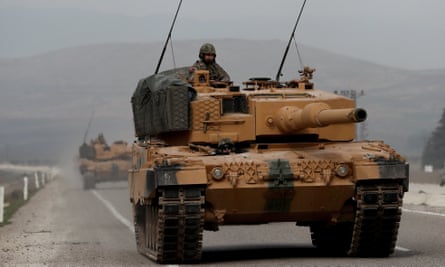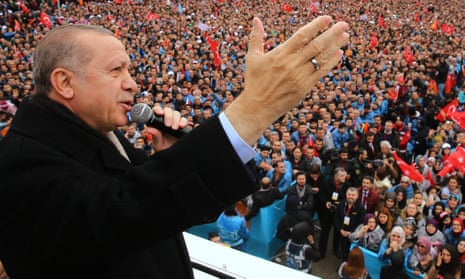Recep Tayyip Erdoğan’s Kurdish vendetta has taken a dramatic new twist with the cross-border ground assault on the Afrin enclave in north-west Syria.
Defying Russia, the US, and Bashar al-Assad’s regime, Turkey’s headstrong president is betting on a decisive victory over Syrian Kurd forces. But his risky gamble could quickly turn sour.
The initial incursion by Turkish troops and their Free Syrian Army (FSA) allies on Sunday, preceded by days of airstrikes and artillery shelling, appeared tentative and limited in scope. The Syrian Kurd People’s Protection Units (YPG) militia, said to number 10,000 fighters in Afrin, is not giving an inch. They are dug in and they are defending the Rojava – the fabled Kurdish homeland.
In 2011, after the Syrian war erupted, Erdoğan adopted the west’s aim of ousting Assad. When Islamic State emerged in Syria and Iraq, Nato member Turkey ostensibly prioritised its defeat. But since 2015, when a ceasefire with Turkey’s Kurdistan Workers’ party (PKK) militants broke down, the Kurdish “terrorist threat” emanating from Syria and Iraq has become Erdoğan’s big obsession.
Erdoğan used a failed army coup attempt in 2016 to justify a crackdown on pro-Kurdish political parties, whose elected leaders remain in jail. He also cut a de facto deal with Assad’s allies, Russia and Iran, accepting their Syria agenda. In return, they acquiesced in Erdoğan’s first big Syria incursion in 2016.
For Erdoğan and likeminded nationalists, the idea of an autonomous or independent Kurdish entity stretching from northern Iraq to Turkey’s Hatay province in the west, and potentially embracing parts of south-east Turkey, is an existential nightmare. Preventing it has eclipsed other considerations. Now the president is chancing his arm again.
Erdoğan’s big problem, Kurdish resistance aside, is that none of the big players support him. He was obliged to send officials to Moscow last week to obtain Russia’s agreement. Even so, the Russian foreign ministry expressed serious concern on Sunday.
Russia has pulled back its ground forces to prevent accidental clashes. But it still controls the airspace over Afrin and could step in at any time. Assad is furious with Erdoğan, and so too, presumably, are his puppet-masters in Iran. Damascus has threatened to hit back militarily – especially if Erdoğan pursues his threat to advance east towards Manbij, another Kurdish stronghold.
All three – Iran, Assad and Russia – would rather have the Kurds controlling swaths of northern Syria than Isis, similar Salafist groups or US-backed, anti-regime rebels such as the FSA. They are meanwhile promoting their own self-serving plans for a post-war settlement. Erdoğan’s maverick behaviour could jeopardise that.

Erdoğan is also at odds with the Trump administration, and not for the first time. There are longstanding tensions over perceived past Turkish ambivalence towards Isis, Nato use of Turkish air bases, visas for Turkish citizens and Erdoğan’s claims that the 2016 coup was masterminded from the US by an exiled cleric.
The US refusal to end its backing for the YPG, which it regards as an effective ally against Isis and against the next big threat, a resurgent al-Qaida, has driven relations to breaking point. Rex Tillerson, the US secretary of state, made matters worse last week with an open-ended commitment to maintain or increase the US military presence in Kurdish-held areas of Syria.
A US plan to train a 30,000-strong border force comprising the Kurdish-led Syrian Democratic Forces, an FSA rival, seems to have sent an already livid Erdoğan over the edge. Tillerson later claimed Washington’s intentions had been misunderstood, and the Pentagon and the State Department made conciliatory noises on Sunday.
But Erdoğan is unbending. Rightly or wrongly, he sees northern Syria as Turkey’s number one security challenge. He also appears, yet again, to be dealing the “Kurdish terror” card to a domestic audience. Turkey’s leader is now almost totally isolated internationally – but appears not to care.
